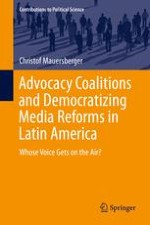2016 | OriginalPaper | Chapter
5. Brazil: Much Debate About No Reform
Author : Christof Mauersberger
Published in: Advocacy Coalitions and Democratizing Media Reforms in Latin America
Publisher: Springer International Publishing
Activate our intelligent search to find suitable subject content or patents.
Select sections of text to find matching patents with Artificial Intelligence. powered by
Select sections of text to find additional relevant content using AI-assisted search. powered by
